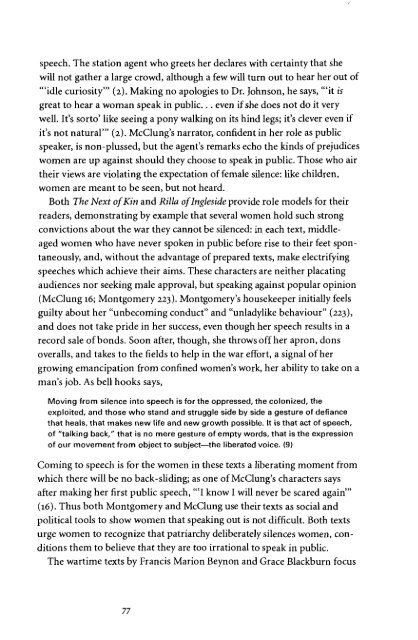Jean Rivard - University of British Columbia
Jean Rivard - University of British Columbia
Jean Rivard - University of British Columbia
Create successful ePaper yourself
Turn your PDF publications into a flip-book with our unique Google optimized e-Paper software.
speech. The station agent who greets her declares with certainty that she<br />
will not gather a large crowd, although a few will turn out to hear her out <strong>of</strong><br />
'"idle curiosity'" (2). Making no apologies to Dr. Johnson, he says, "'it is<br />
great to hear a woman speak in public.. . even if she does not do it very<br />
well. It's sorto' like seeing a pony walking on its hind legs; it's clever even if<br />
it's not natural'" (2). McClung's narrator, confident in her role as public<br />
speaker, is non-plussed, but the agent's remarks echo the kinds <strong>of</strong> prejudices<br />
women are up against should they choose to speak in public. Those who air<br />
their views are violating the expectation <strong>of</strong> female silence: like children,<br />
women are meant to be seen, but not heard.<br />
Both The Next <strong>of</strong> Kin and Rilla <strong>of</strong>lngleside provide role models for their<br />
readers, demonstrating by example that several women hold such strong<br />
convictions about the war they cannot be silenced: in each text, middleaged<br />
women who have never spoken in public before rise to their feet spontaneously,<br />
and, without the advantage <strong>of</strong> prepared texts, make electrifying<br />
speeches which achieve their aims. These characters are neither placating<br />
audiences nor seeking male approval, but speaking against popular opinion<br />
(McClung 16; Montgomery 223). Montgomery's housekeeper initially feels<br />
guilty about her "unbecoming conduct" and "unladylike behaviour" (223),<br />
and does not take pride in her success, even though her speech results in a<br />
record sale <strong>of</strong> bonds. Soon after, though, she throws <strong>of</strong>f her apron, dons<br />
overalls, and takes to the fields to help in the war effort, a signal <strong>of</strong> her<br />
growing emancipation from confined women's work, her ability to take on a<br />
man's job. As bell hooks says,<br />
Moving from silence into speech is for the oppressed, the colonized, the<br />
exploited, and those who stand and struggle side by side a gesture <strong>of</strong> defiance<br />
that heals, that makes new life and new growth possible. It is that act <strong>of</strong> speech,<br />
<strong>of</strong> "talking back," that is no mere gesture <strong>of</strong> empty words, that is the expression<br />
<strong>of</strong> our movement from object to subject—the liberated voice. (9)<br />
Coming to speech is for the women in these texts a liberating moment from<br />
which there will be no back-sliding; as one <strong>of</strong> McClung's characters says<br />
after making her first public speech, "Ί know I will never be scared again'"<br />
(16). Thus both Montgomery and McClung use their texts as social and<br />
political tools to show women that speaking out is not difficult. Both texts<br />
urge women to recognize that patriarchy deliberately silences women, conditions<br />
them to believe that they are too irrational to speak in public.<br />
The wartime texts by Francis Marion Beynon and Grace Blackburn focus<br />
77

















